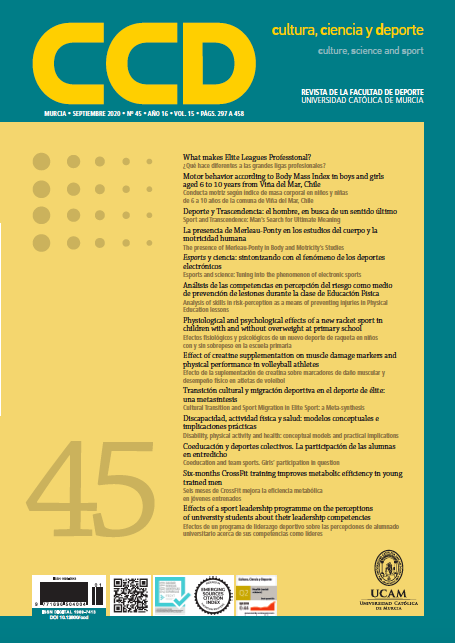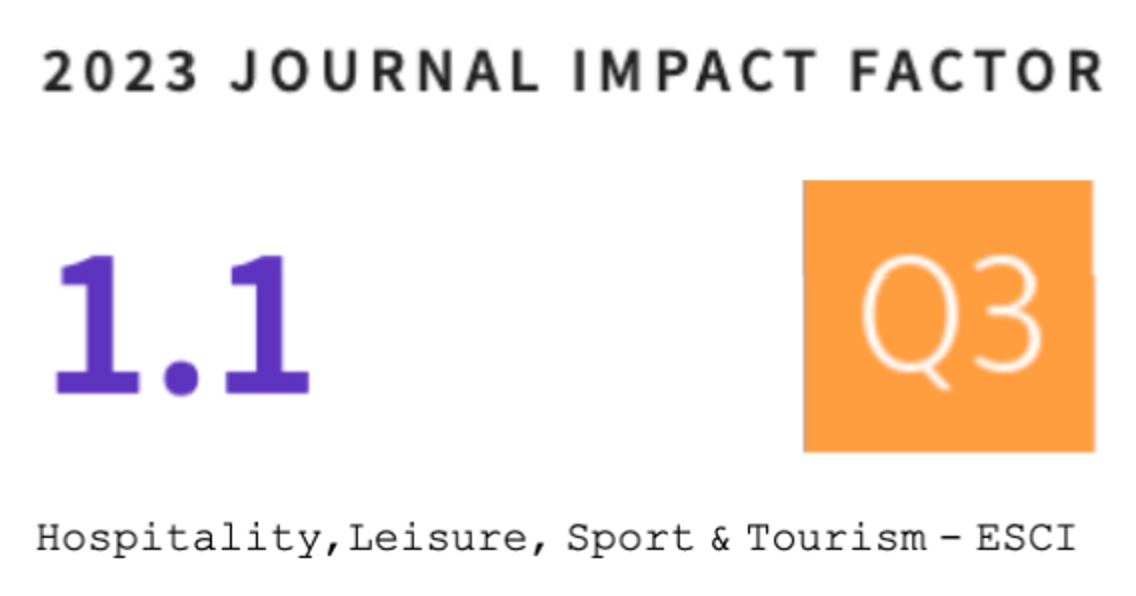Effect of creatine supplementation on muscle damage markers and physical performance in volleyball athletes (Efecto de la suplementación de creatina sobre marcadores de daño muscular y desempeño físico en atletas de voleibol)
DOI:
https://doi.org/10.12800/ccd.v15i45.1515Palabras clave:
DOMS, muscle injury, jumping, performance (DOMS, lesión muscular, saltos, desempeño)Resumen
Given that creatine supplementation may attenuate exercise-induced damage and directly influence the ATP-CP system, predominant in volleyball, the purpose of the study is to evaluate the effects of creatine (Cr) supplementation on muscle damage markers; creatine kinase (CK) and lactate dehydrogenase (LDH), delayed onset muscle soreness (DOMS) and physical performance in volleyball athletes.
Fourteen volleyball players (under- 20 y) were divided into 2 groups: Creatine supplemented and Placebo. Double-blind controlled supplementation was performed using (0.3 g/kg) creatine or placebo for 7 days (loading phase) and (0.1 g/kg) for the next 4 days (maintenance phase). Before and after the supplementation phases, the players underwent Physical Performance Testing and blood sample collection to evaluate CK, LDH, and plasma creatine concentration.
===
Dado que la suplementación con creatina puede atenuar el daño inducido por el ejercicio e influir directamente en el sistema ATP-CP, predominante en el voleibol, el propósito del estudio es evaluar los efectos de la suplementación con creatina (Cr) sobre los marcadores de daño muscular como creatina quinasa (CK) y lactato deshidrogenasa (LDH), dolor muscular de aparición tardía (DOMS) y rendimiento físico en atletas de voleibol. Se realizó un estudio controlado con modelo doble ciego, en el que catorce jugadores de voleibol (menores de 20 años) se dividieron en 2 grupos: creatina y placebo donde suplementaban (0.3 g/kg) de creatina o placebo durante 7 días (fase de carga) y 0.1 g/kg) durante los siguientes 4 días (fase de mantenimiento). Antes y después de cada fase de suplementación, los jugadores se sometieron a pruebas de rendimiento físico y recolección de muestras de sangre para evaluar CK, LDH y la concentración de creatina en plasma.
Citas
Bosco, C., Luhtanen, P., & Komi, P. V. (1983). A simple method for mea¬surement of mechanical power in jumping. Eur J Appl Physiol Occup Physiol, 50(2), 273-282. doi:10.1007/bf00422166
Branch, J. D. (2003). Effect of creatine supplementation on body com¬position and performance: a meta-analysis. Int J Sport Nutr Exerc Metab, 13(2), 198-226. doi:10.1123/ijsnem.13.2.198
Brown, S. J., Child, R. B., Day, S. H., & Donnelly, A. E. (1997). Exercise-in¬duced skeletal muscle damage and adaptation following repeated bouts of eccentric muscle contractions. J Sports Sci, 15(2), 215-222. doi:10.1080/026404197367498
Buford, T. W., Cooke, M. B., & Willoughby, D. S. (2009). Resistance exer¬cise-induced changes of inflammatory gene expression within human skeletal muscle. Eur J Appl Physiol, 107(4), 463-471. doi:10.1007/ s00421-009-1145-z
Cheung, K., Hume, P., & Maxwell, L. (2003). Delayed onset muscle sore¬ness : treatment strategies and performance factors. Sports Med, 33(2), 145-164. doi:10.2165/00007256-200333020-00005
Clark, J. F. (1996). Creatine and Creatine phosphate, Scientific and clin¬ical perspectives: Uses of Creatine Phosphate Supplementation for the Athlete. In (pp. 217-226): Academic Press doi: 10.1016/B978- 012186340-1/50016-3.
Galan, B. S., Carvalho, F. G., Santos, P. C., Gobbi, R. B., Kalva-Filho, C. A., Papoti, M., … Freitas, E. C. (2018). Effects of taurine on mark¬ers of muscle damage, inflammatory response and physical perfor¬mance in triathletes. J Sports Med Phys Fitness, 58(9), 1318-1324. doi:10.23736/S0022-4707.17.07497-7
Goodall, S., & Howatson, G. (2008). The effects of multiple cold water im¬mersions on indices of muscle damage. J Sports Sci Med, 7(2), 235-241.
Greenhaff, P. L., Casey, A., Short, A. H., Harris, R., Soderlund, K., & Hul¬tman, E. (1993). Influence of oral creatine supplementation of muscle torque during repeated bouts of maximal voluntary exercise in man. Clin Sci (Lond), 84(5), 565-571. doi:10.1042/cs0840565
Harris, R. C., Söderlund, K., & Hultman, E. (1992). Elevation of creatine in resting and exercised muscle of normal subjects by creatine supple¬mentation. Clin Sci (Lond), 83(3), 367-374. doi:10.1042/cs0830367
Hultman, E., Söderlund, K., Timmons, J. A., Cederblad, G., & Greenhaff, P. L. (1996). Muscle creatine loading in men. J Appl Physiol (1985), 81(1), 232-237. doi:10.1152/jappl.1996.81.1.232
Kirksey, B. S., Michael H. Warren, Beverly J. Johnson, Robert l. Stone, Meg. Haff, G. Gregory. Williams, Franklin E. Proulx, Christopher. (1999). The effects of six weeks of creatine monohydrate supplemen¬tation on performance measures and body composition in collegiate track and field athletes. In (Vol. 13, pp. 148-156): J Strength Cond Res.
Ramírez-Campillo, R., González-Jurado, J. A., Martínez, C., Nakamura, F. Y., Peñailillo, L., Meylan, C. M., Izquierdo, M. (2016). Effects of plyometric training and creatine supplementation on maximal-inten¬sity exercise and endurance in female soccer players. J Sci Med Sport, 19(8), 682-687. doi:10.1016/j.jsams.2015.10.005
Jiménez-Reyes, P., Cuadrado-Peñafiel, V., & González-Badillo, J. J. (2011). Analysis of Variables Measured in Vertical Jump Related to Athletic Performance and its Application to Training In (Vol. 6, pp. 113-119): Cultura_Ciencia_Deporte. doi: 10.12800/ccd.v6i17.38.
Saks, V.A., Strumia, E. (1993). Phosphocreatine: molecular and cellular aspects of the mechanism of cardioprotective action. Curr Ther Res; 53: 565–598. doi:10.1016/S0011-393X(05)80663-0
Santos, R.V.T., Bassit, R.A., Caperuto, E.C., Costa Rosa, L.F. (2004). The effect of creatine supplementation upon inflammatory and muscle soreness markers after a 30km race. Life Sci; 75: 1917-1924. doi: 10.1016/j.lfs.2003.11.036
Smith, L.L. (2004). Tissue trauma: the underlying cause of overtraining syndrome? J Strength Cond Res; 18:185-193. doi:10.1510/00124278- 200402000-00028
Stanton. R., Abt, G.A. (2000). Creatine monohydrate use among elite Australian power lifters. J. Strength Cond Res; 14: 322–327. doi: 10.1519/00124278-0000800-00013
Terjung, R.L., Clarkson, P., Eichner, E.R., Greenhaff, P.L., Hespel, P.J., Israel, R.G., Kraemer, W.J., Meyer, R.A., Spriet, L.L., Tarnopolsky, M.A., Wagenmakers, A.J., Williams, M.H. (2000). American College of Sports Medicine roundtable. The physiological and health effects of oral creatine supplementation. Med Sci Sports Exerc; 32,3:706-717. doi:10.1097/00005768-200003000-00024
Tidball, J.G. (2005). Inflammatory processes in muscle injury and repair. Am J Physiol Regul Integr Comp Physiol; 288: 345-353. doi:10.1152/ ajpregu.00454.2004
Tofas, T., Jamurtas, A.Z, Fatouros, I., Nikolaidis, M.G., Koutedakis, Y., Sinouris, E.A., Papageorfakopoulou, N., Theocharis, D.A. (2008). Plyometric exercise increases serum indices of muscle damage and collagen breakdown. J. Strength Cond. Res; 22; 490-496. doi:10.1519/ JSC.0b013e31816605a0
VanDusseldorp, T.A., Escobar, K.A, Johnson, K.E., Stratton, M.T., Mori¬arty, T., Cole, N., Mc-Cormick, J.J., Kerksick, C.M., Vaughan, R.A., Dokladny, K., Kravitz, L., Mermier, C.M. (2018). Effect of Branched- Chain Amino Acid Supplementation on Recovery Following
Descargas
Publicado
Cómo citar
Número
Sección
Licencia
Los autores que publican en esta revista están de acuerdo con los siguientes términos:- Los autores conservan los derechos de autor y garantizan a la revista el derecho de ser la primera publicación del trabajo al igual que licenciado bajo una Creative Commons Attribution License que permite a otros compartir el trabajo con un reconocimiento de la autoría del trabajo y la publicación inicial en esta revista.














